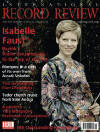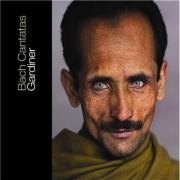Texte paru dans: / Appeared in:
*

International Record Review - (09//2013)
Pour
s'abonner / Subscription information
Soli Deo Gloria
SDG185

Code-barres / Barcode : 0843183018529
With this release the epic Bach Cantata series from John Eliot Gardiner, the Monteverdi Choir and the English Baroque Soloists has finally drawn to its close. It might seem symbolic that it ends with cantatas written for the Ascension, but there is an extra-musical relevance here, which also explains why not only was this recorded so many years behind the others but why all except one of the solo singers are appearing in the series for the first time.
Originally performed and recorded during the 2000 ‘Pilgrimage’ during which Gardiner and his Monteverdi Choir performed all of Bach’s cantatas in different locations over a 12-month period marking the 250th anniversary of Bach’s death the recordings made on that occasion in Salisbury Cathedral were found to be unfit for release due to excessive background noise, and as a result these four cantatas almost slipped through the net. Luckily what Soli Deo Gloria describes as ‘A heartfelt appeal from comedian Alexander Armstrong’ resulted in hundreds of donors from around the world providing the funds to present the cantatas in a live performance at St Giles, Cripplegate on May 10th, 2012, and it is from that performance that these recordings were made.
There are certainly no noise issues here; even by Soli Deo Gloria standards this is an exceptional recording, crystal-clear and wholly focused on the music itself. It opens gently with the lilting orchestral opening to BWV 43 which suddenly, almost shockingly, ignites with trumpets and drums and a mighty opening chorale which Gardiner sweeps along in waves of tautly disciplined but gloriously life-affirming choral energy. The first of the ‘new’ soloists — tenor Andrew Tortise (new to this Bach cantata series, maybe, but familiar to most IRR readers through some excellent appearances on recordings ranging from Lully to Britten) — sets the standard for some consistently excellent solo singing on the disc with a beautifully enunciated recitative and a gloriously agile aria, ‘Ja tausend mal tausend begleiten den Wagen’.
The other two soloists appearing for the first time in this series are soprano Lenneke Ruiten, who soars ethereally over the jaunty accompaniment of the closing aria from Part 1 of Gott f]ahret auf mit Jauchzen, BWV43, ‘Mein Jesus hat nunmehr’ , and Meg Bragle, who finds a not wholly satisfactory balance between the purity of a countertenor and the warmth of a full-blooded contralto. But Bragle is clearly a singer of intense musical perceptiveness, as she vividly reveals in the central aria of BWV 11, Lobet Gott in seinen Reichen, ‘Ach, bleibe doch, mein liebstes Leben’ , where the recording picks up an almost whispering quality to her voice which I find utterly irresistible.
This intimate and reflective aria, familiar through its subsequent manifestation in the ‘Agnus Dei’ of the B minor Mass, seems vaguely incongruous in a cantata which is generally so upbeat. Gardiner suggests in his customarily effusive and detailed booklet notes that the opening and closing choruses are ‘full of rhythmic swagger, a jazz-like nonchalance, plenty of stratospheric glitter for the high trumpets and vocal acrobatics for the choir’, and these qualities he very much brings out in performances which are full of life and vigour. As ever, his tempos are adventurous but so well managed that, while seeming to keep everyone (listeners included) on the very tip of their toes, everything remains musically taut, controlled and sufficiently spacious for every minute detail to be clearly enunciated ( not least some of the closing consonants which attack the microphones with almost physical violence).
A link with the earlier issues in the series comes with the German baritone Dietrich Henschel, who, appropriately enough, is at his most impressive and certainly his most dramatic in the action-packed recitative and aria (‘Es kommt der Heiden Held/Er ist’s, der ganz Allein’) from BWV43 . With such flawless articulation and impeccable delivery of diction, not to mention an inexhaustible supply of vocal energy, one wonders whether Henschel might not be more than happy to go back and do the whole crop of cantatas again.
Certainly Gardiner, whose 70th birthday coincided with
the release of this disc, seems to have the energy and enthusiasm to spare
to set off and do the whole thing again for, if one word sums up this entire
series, it is spontaneity. There has been an overriding sense throughout the
whole 28 volumes of the musicians exploring the music as if for the first
time. Not that there has been any lessening of the high standards of
technical and musical polish which characterizes any and everything Gardiner
sets his name to, it’s just that there has been a kind of fresh faced,
awestruck delight to be experienced round every musical corner. These are
performances which feel more as if they have hit the ground running than
been painstakingly prepared. It has been an uplifting and inspirational
experience for all involved, I suspect, and it has been a source of
continual joy and inner enrichment to join in as a listener. This final
disc, despite coming so far after the others, is in no way an
exception.
Fermer la fenêtre/Close window
Cliquez l'un ou l'autre
bouton pour découvrir bien d'autres critiques de CD
Click either button for many other reviews


